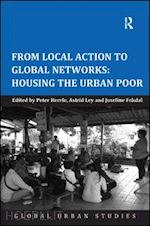Contents: Introduction: housing processes taking roots in local action and extending to global networks, Peter Herrle, Astrid Ley and Josefine Fokdal. Part I Qualities of Networks by Urban Poor: Urban poor housing development in Asia: from target group to negotiating partner, Somsook Boonyabancha and Thomas Kerr; How urban poor networks are re-scaling the housing process in Thailand, the Philippines and South Africa, Astrid Ley, Josefine Fokdal and Peter Herrle; Transnational networks of urban poor federations and their modes of action and cooperation - lessons from Tanzania, Beate Ginzel. Part II Positioning of Urban Poor Networks: Moving from consultation to empowerment? The role of slum dweller organizations in global policy networks, Interview with Gunter Meinert and Rene Peter Hohmann; From grassroots shacks to the towers of power: relationship building of transnational urban poor networks. Experiences from Africa and Asia, Josefine Fokdal, Astrid Ley and Peter Herrle; Quiet conflict: institutional change, informal settlement upgrading, and formalized partnerships between local authorities and urban social movements in South Africa, Benjamin H. Bradlow; Transforming the housing process in the Philippines: the role of local-global networks by the urban poor, Anna Marie Karaos and Emma Porio. Part III Urban Poor Networks in Global Development Policy: Urban grassroots movements and agencies of development cooperation, Klaus Teschner; Making sure the 'voices of the poor' are heard: why forms of transnational activism can make a difference, Diana Mitlin; Grappling with housing issues at the city scale: mobilizing the right to the city in South Africa, Liza Cirolia, Warren Smit and James Duminy; Collective strength by global networks of the urban poor: policy implications of affordable housing and co-development strategies, Matt Nohn; Transnational networks of urban poor: key for a more collaborative urban governance?, Peter Herrle, Josefine Fokdal and Astrid Ley. Index.











